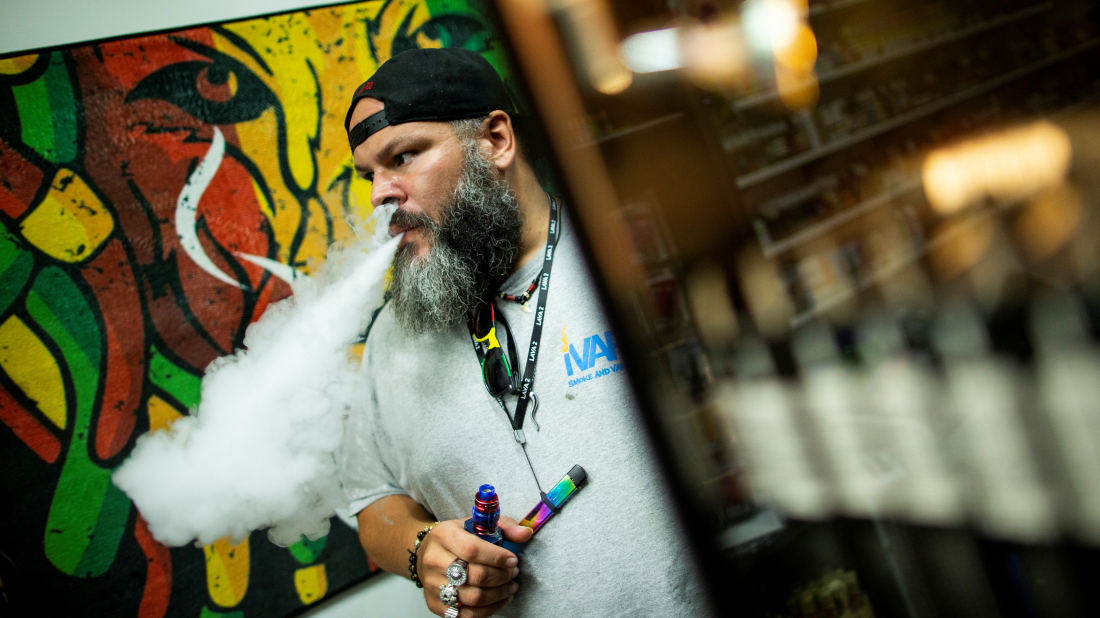Mexico confirms World Cup venues unchanged after cartel leader killing
Mexico’s President Claudia Sheinbaum on Thursday thanked FIFA and its president, Gianni Infantino, for reaffirming that the country’s 2026 World C...

British American Tobacco (BAT) is preparing to sell its first disposable vape in the U.S. reversing years of opposition to unauthorised devices amidst a booming $8 billion market for synthetic nicotine products.
The product, Vuse One is yet to receive approval from the U.S. Food and Drug Administration (FDA), but is set to join the market.
Since July 2022, FDA rules require synthetic nicotine products to have agency approval. Many manufactures have ignored these rules resulting in a lucrative but illegal market.
BAT estimates U.S. single-use vape sales at $8 billion last year, around 70% of total industry sales.
The tobacco giant’s U-turn comes after years of lobbying lawmakers and pursuing court cases to block unauthorised disposable vapes, calling them a threat to consumers.
Now, the market for these products, often high in nicotine and appealing flavours, has exploded, causing BAT and rivals such as Altria to reconsider their stance.
Luis Pinto, the company’s U.S. spokesman, said, “Not having access to this world weighs on our company's bottom line.”
The British company has publicly acknowledged the pressure of lost sales due to unregulated competitors, which has driven this sudden U-turn.
Rather than relying on FDA premarket authorisation, Pinto emphasised that BAT plans to enforce internal compliance measures, including age verification and controlled distribution, and avoid youth-oriented flavours and promotions.
The FDA has stressed that marketing a product without premarket authorisation is unlawful. While BAT has a pending application for Vuse One, the agency has not granted a “legal safe harbour” for sales.
While FDA is meant to review applications within 180 days, delays have often stretched to years, leaving legal uncertainty and a booming grey market.
The company has cited the FDA’s use of “enforcement discretion” in other cases to justify its launch.
Public health advocates and campaigners have sharply criticised BAT’s decision, warning that marketing and retailer safeguards cannot replace FDA premarket authorisation.
Critics, however, warn that such reliance on marketing and retail oversight cannot replace regulatory approval, and that public health risks, particularly for underage users, remain significant.
Brian King, executive vice president for U.S. tobacco control programmes at the Campaign for Tobacco-Free Kids, described the move as “illegal and dangerous,” highlighting the risks to minors and non-smokers.
Consumer groups and social media commentators have also voiced concern, accusing the global tobacco firm of prioritising profits over public safety.
Many point to the broader explosion of unregulated synthetic nicotine products in the U.S., which have drawn young users with flavours such as “rainbow bubblegum” and “cookie butter."
This trend suggests that permitting unauthorised sales, even under corporate oversight, could worsen health risks and normalise underage vaping.
Synthetic nicotine, produced in labs rather than extracted from tobacco, has allowed companies to sidestep existing regulations, though the FDA has clarified that premarket approval is still required.
Tobacco use is the leading preventable cause of disease and death in the U.S., responsible for around 480,000 deaths each year, mostly from cancer.
According to the CDC, around 2.5 million U.S. high school students reported using e-cigarettes in 2024, many favouring disposable devices with high nicotine concentrations and sweet flavours.
A F-16 fighter jet of the Turkish Air Force crashed near a highway in western Türkiye early on Wednesday (25 February), killing its pilot, officials and media reports confirmed.
U.S. President Donald Trump declared a “golden age” for America in his first second-term State of the Union on Tuesday evening, delivering the longest-ever address at more than 90 minutes. Here are the main takeaways.
President Donald Trump delivered the first State of the Union address of his second term to Congress on Wednesday (25 February), declaring that America’s “golden age” had begun and that the country was experiencing a “turnaround for the ages.”
Start your day informed with AnewZ Morning Brief. Here are the top news stories for the 25th of February, covering the latest developments you need to know.
Peace-making has a habit of creating new enemies - especially when it reduces someone else’s leverage. As Azerbaijan and Armenia move toward a settlement architecture that no longer depends on Moscow as the indispensable broker, pressure has not vanished; it has shifted shape.
Global debt surged to a record $348.3 trillion at the end of 2025, after nearly $29 trillion was added over the year, marking the fastest annual increase since the pandemic, according to the Institute of International Finance (IIF) report released on Wednesday.
Millions of Colombian roses have arrived in the United States just in time for Valentine’s Day, keeping the country on track as the world’s second-largest flower exporter. Between 15 January and 9 February, Colombia shipped roughly 65,000 tons of fresh-cut blooms.
Russia’s car market is continuing to receive tens of thousands of foreign-brand vehicles via China despite sanctions imposed after Moscow’s full-scale invasion of Ukraine in 2022, a journalistic investigation has found.
Türkiye’s national energy company, TPAO, has struck a new cooperation deal with U.S. energy giant Chevron, signing a memorandum of understanding to explore joint oil and gas exploration and production opportunities, the Turkish Energy and Natural Resources Ministry announced on Thursday.
Wall Street ended sharply lower on Tuesday as investors worried about artificial intelligence (AI) creating more competition for software makers, keeping them on edge ahead of quarterly reports from Alphabet and Amazon later this week.
You can download the AnewZ application from Play Store and the App Store.

What is your opinion on this topic?
Leave the first comment